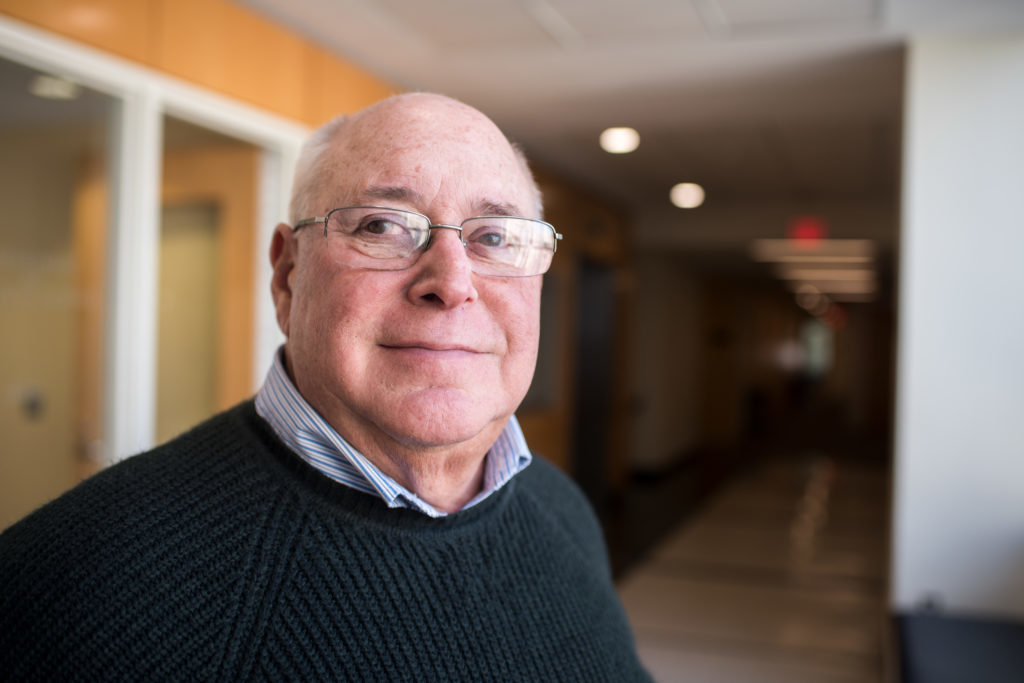As a man with self-proclaimed “plebeian tastes” when it comes to film, political science and film studies professor Harvey Feigenbaum said he prefers the movies that the Oscars stubs.
In his lifelong study of the field, Feigenbaum said he favors action movies to artsy ones. He said Hollywood only gives you two choices: pretentious or “low-brow.” He often chooses the latter, selecting action flicks with explosions and car crashes.
But those films aren’t chosen when it comes time for Academy Award nominations, he said.
Despite his personal tastes, his expertise and knowledge of how the film industry doles out awards was put to the test as he predicted Oscar winners this year.
Ahead of this year’s Academy Awards, which air Sunday at 8 p.m., Feigenbaum sat down with The Hatchet to make his picks for the Best Picture, Best Actor and Best Actress.
Best Picture
Feigenbaum isn’t positive on a pick for this year’s Best Picture, but he knows which movie he doesn’t want to win. The drama “Darkest Hour” follows the trials of Winston Churchill in World War II, but it failed to earn Feigenbaum’s vote for Best Picture.
“I’m fascinated by the World War II era and I really wanted to like it – but I didn’t,” he said.
Feigenbaum’s main critique of “Darkest Hour” was its Hollywood script, which he said idealized Churchill and contained too much fictional material.
“I don’t mind if films are historically inaccurate, but I mind when they’re very conventional and cliched, which is what this was,” he said.
Also set in World War II, Christopher Nolan’s “Dunkirk” similarly disappointed Feigenbaum. The film follows the 1940 Dunkirk evacuation, in which Allied soldiers spent nine days stranded on the beaches. While Feigenbaum felt the film’s cinematography was up to par, he said the plot was unmoving.
“‘Dunkirk’ is something that means a lot to the British. It’s possible that when they watched the movie, they bring an emotional baggage that we don’t have when we watch it,” Feigenbaum said. “I think it was visually an attractive movie but there was not enough to engage your mind.”
Although nine movies are in the running for Best Picture, Feigenbaum considers “Get Out,” “Three Billboards Outside Ebbing, Missouri” and “Lady Bird” the most probable winners. Feigenbaum said the political climate and Greta Gerwig as one of the few female directors could lead to a “Lady Bird” win.
“You have to think that this year’s going to be different because of the #MeToo movement,” he said. “People are moved by the fashion of the moment.”
Feigenbaum said the Best Picture nomination often leaves out mainstream movies because nominators prioritize complexity over audience captivation.
“I think the Best Picture has to make people feel their experience is partially artistic, not just entertainment,” he said. “If it’s merely entertaining, I think they’re guilty about voting for it.”
Best Actress in a Leading Role
The Best Actress category nominated powerful roles this year, Feigenbaum said.
Although Meryl Streep’s performance as Katharine Graham in “The Post” was strong, he said the award will likely go to a different nominee.
“Even though I think she was brilliant, she has too many Oscars frankly,” he said. “I think they’ll try and let someone else have a chance.”
He said part of the reason he was drawn to “Three Billboards Outside Ebbing, Missouri” was because of its star, Frances McDormand, which could be telling of a possible winner.
Despite Feigenbaum’s appreciation of McDormand, he said Saoirse Ronan’s performance as the namesake in “Lady Bird” or Margot Robbie’s portrayal of Tonya Harding in “I, Tonya” will prevail.
“I would guess it would come down to Soairse Ronan or Margot Robbie just because it’s the unconventional pick,” he said. “Lady Bird’s gotten such rave reviews and it’s a conventional coming-of-age story, but Robbie’s the pretty girl who most people never thought of as a deep actress.”
Best Actor in a Leading Role
Feigenbaum only has one pick for Best Actor. Although the script didn’t sit well with him, Feigenbaum said Gary Oldman’s performance as Winston Churchill in “Darkest Hour” is the only choice for the Best Actor category.
But Feigenbaum also recognized Timothée Chalamet’s performance in “Call Me by Your Name” as a possible winner because this year marks Chamalat’s first Oscar nomination at 22 years old, something the academy tends to lean toward.
Feigenbaum said the key to scoring a Best Actor nod doesn’t just have to do with the actor’s ability – the script needs to allow the actor to show off a range of emotions.
“Generally, the roles that do well are ones that they can do a lot of emoting, have a very articulate script,” he said.





